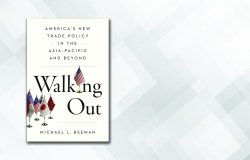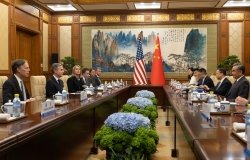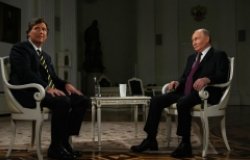Book Launch: <i>Parliament & Congress</i>
Co-Author William McKay, Former Clerk, UK House of Commons; Co-Author Charles W. Johnson, Former Parliamentarian, U.S. House of Representatives; Commentator Walter J. Oleszek, Senior Specialist, Congressional Research Service; Moderator Don Wolfensberger, Director, The Congress Project, Woodrow Wilson Center
Overview
Panelists: Co-Author William McKay, Former Clerk, UK House of Commons; Co-Author Charles W. Johnson, Former Parliamentarian, U.S. House of Representatives; Commentator Walter J. Oleszek, Senior Specialist, Congressional Research Service; Moderator Don Wolfensberger, Director, The Congress Project, Woodrow Wilson Center
Some political observers say Congress is becoming much more like a parliament with its strict party-line voting on major issues. Former House Parliamentarian Charles Johnson says the heightened partisanship in Congress is not making it a better place to work or legislate, and he doesn't see things getting better. Johnson's counterpart, William McKay, who spent 40 years working in the U.K. House of Commons, projected a more optimistic view of that body as it asserts new powers over the government, especially through investigative select committees.
According to Johnson, who is also a 40-year veteran of working of the national legislature, there have been some abrupt changes in Congress in recent years that have led to greater unfairness to the minority party, less opportunities for Members to participate in the legislative process, and less inclination by Members to reach across the aisle and work with their colleagues on common interests. Johnson attributes the changes to a variety of factors including the introduction of televised proceedings which have reduced spontaneity and deliberation; the control of the House Rules Committee by the Speaker and trend towards fewer and fewer floor amendments; partisan reapportionment which has led to more partisan congressional districts; and campaign financing which consumes Members' time and pits special interest groups against each other in the legislative process.
McKay, on the other hand, says while he ordinarily doesn't like change, and Members of Parliament tend to resist it, he is encouraged by some of the changes taking place in the "Mother of Parliaments." Some of it has been driven by scandals relating to Members' expense accounts, some by Members' desire to assert more control over the government, and some by the new coalition government formed between the Tories and Liberals. While the question period in the House of Commons is still very popular, committees for the first time are also calling the Cabinet ministers before them to question them about the operations of their departments. Ironically, while Members run for Parliament to form the government, they see their role once they get there as controlling the government and scrutinizing its operations. McKay said that the select investigative committees are run in a bipartisan way and tend to be more interested in ferreting out the facts than in scoring political points off each other. While the House of Commons approves the government's budget without question, it nevertheless is conscientious about overseeing how the money is actually spent.
Thank you for your interest in this event. Please send any feedback or questions to our Events staff.











